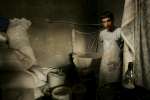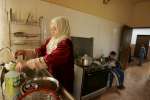- Text size
 |
|  |
|  |
| 
- Français
Breaking the fast away from home brings back memories
News Stories, 16 July 2015
BAHARKA, Iraq, July 16. (UNHCR) – Yazi looks down on the small open fire outside her tent. She is overseeing the preparation of the day's iftar – the traditional meal for the breaking of the Ramadan fast.
It is about an hour until sunset and Baharka Internally Displaced Persons (IDP) camp, where midday heat tops 40 degrees Celsius, is at last beginning to cool off.
Outside, the gravel streets are almost deserted.
Yazi's family is one of the few fasting; others say the hardships of camp life and being displaced from their homes has made it impossible to observe the holy month.
An observant Muslim, Yazi cuts an imposing figure in a wide, camouflage print abaya. She wipes the sweat from her face and adjusts her headscarf as she closely watches her 10-year-old granddaughter carefully rotate chicken and tomato skewers.
Originally from a village near Mosul, Yazi's cheeks, forehead and chin are marked with dark traditional tattoos. She does not know her birth date, but she estimates she's about 55 years old.
Yazi's family is among more than one million other Iraqis displaced across the country now sheltering in the Kurdistan Region of Iraq. The region is also hosting almost 250,000 Syrians fleeing violence.
Ramadan, once a time of late nights spent with family and neighbours, has now become a reminder of homes lost and loved ones far away for uprooted Iraqis and Syrians.
Observing the holy month in an IDP camp has been difficult, Yazi admits. The intense heat, lack of shade and intermittent electricity make severe dehydration during summer months a real danger for all residents, especially children and the elderly.
Even on the days she and her adult son fast, she does not allow her younger grandchildren to do so.
"In Mosul, from age seven you would begin to teach them," Yazi said, "but here I don't allow it, life here is just too harsh." Her granddaughter Aya boasts that sometimes she's allowed to fast for half the day.
Baharka camp, spread out on a flat plain outside the northern Iraqi city of Erbil is almost completely lacking in natural shade. Layers of fine dust cover everything.
Beyond the fences, the fields of wild grass that were green in the spring have burned a sandy brown in the summer heat. But Yazi says it's not the living conditions that are making this Ramadan especially difficult – it is the fact that this year her family is spending the holy month apart.
"I only have two sons, I couldn't risk both being killed," she explained.
A widow--her husband was killed in the 1980s during the Iran-Iraq war-- Yazi says that she felt she had no other choice, but to flee Mosul with her younger son and grandchildren just three months ago as life under militant rule became more and more dangerous.
When the militants first took over her village, Yazi admits she welcomed relief from the central Iraqi government's then oppressive rule, but as months passed, the militants became indiscriminate in their use of violence, killing civilians at random.
"My older son told me when he gets the money he will meet us, but so far he hasn't been able to," she added.
To escape Mosul, Yazi sold everything she owned to pay a smuggler to transport her, her son, his wife and child and three of her grandchildren to Baghdad. From the Iraqi capital, the family bought plane tickets to Erbil and came directly to Baharka camp.
"When we landed here I didn't have a single dollar left." Despite moving into an organized camp where the family has access to free water and electricity and food handouts, Yazi's younger son Saif is constantly looking for work to help support the family.
Of the dishes the family is preparing for iftar only the rice and soup were donated by a local aid organization. Vegetables, chicken, even the sugary instant juice that's traditionally drank at the beginning of the meal all had to be purchased.
During the month of Ramadan local aid organizations partnering with UNHCR have increased food donations to families living in camps for refugees and displaced people. In Baharka camp one aid organization distributed three kilograms of chicken to each family at the start of the holy month, another provided a hot iftar meal to each of the camp's residents, but for the vast majority of Ramadan, families like Yazi's have had to fend for themselves.
After iftar Yazi leans back on one of the thin mattresses and lights a cigarette as her grandchildren clear away the plates. By the time one of her children brings out a tray of tea, the tent has begun to fill up with visitors. Most of the people here are families Yazi knew from Mosul, but a few are people her children have befriended from nearby tents in the camp.
Marwan, Yazi's nephew explains that tomorrow night it will be his mother and wife's turn to cook and everyone will gather at their tent a few rows down.
"Honestly, the people who live near here," Marwan says referring to the families gathered in the tent that evening, "we are all relatives."

































